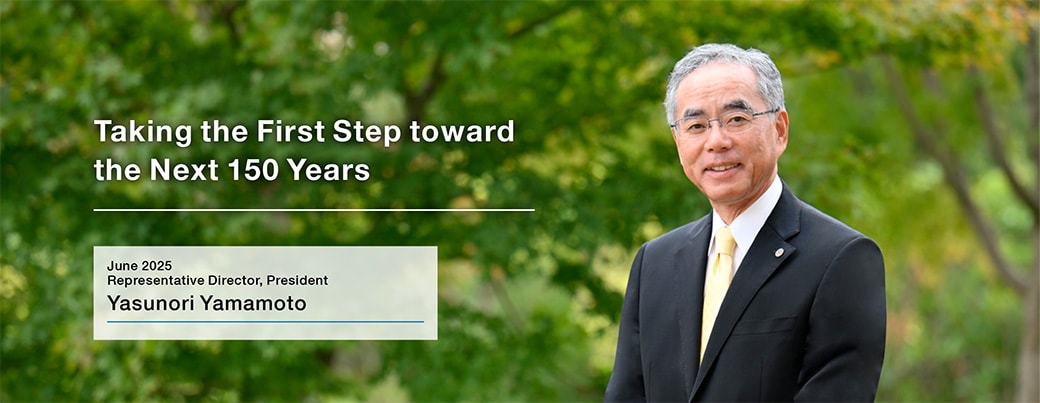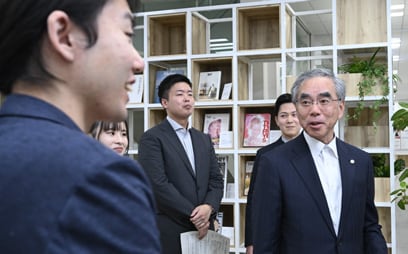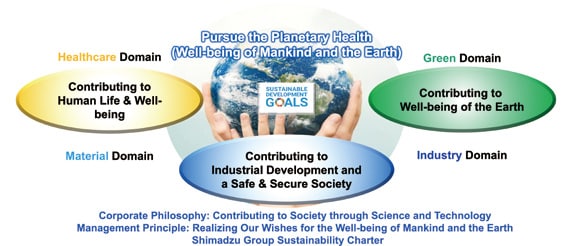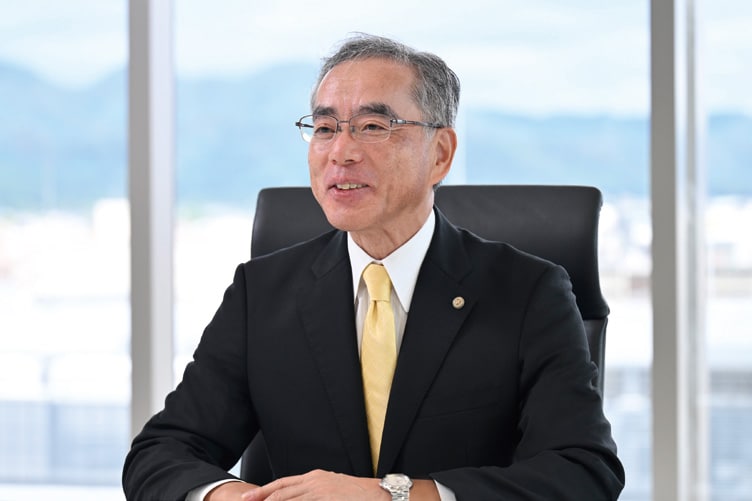
Achieving Sustainable Growth by Contributing to Solving Challenges in Society Based on a Spirit of “Excellence in Science” and “Best for Our Customers”
Shimadzu is committed to solving challenges in society in accordance with our corporate philosophy, “Contributing to Society through Science and Technology” by using robotics and AI technologies to create new value and establish an efficient and robust management foundation rooted in our slogan, “Excellence in Science.”
We are also committed to continuing to address the various needs of customers in regions around the world in a careful and timely manner based on our slogan, “Best for Our Customers,” which is another important core value of Shimadzu.
Accordingly, through these two guiding slogans, “Best for Our Customers” and “Excellence in Science,” we aim to achieve new growth by being an innovative company that solves challenges in society in collaboration with partners all around the world.
150 Years of Progress, 150 Years to Come
In 2025, Shimadzu Corporation celebrates its 150th anniversary, having been founded on March 31, 1875. Over the past 150 years, we have achieved significant growth by staying true to our corporate philosophy and evolving in step with scientific and technological progress. This enduring commitment has helped lay the foundation for the society we serve today.
With each era bringing change, new industries have continually emerged̶ each demanding novel technologies. Guided by the aspirations of our customers, we have persisted without compromise in adding new technologies and translating ideas into drawings and software code. The cumulative result of these efforts represents Shimadzu Corporation today.

Discussion with young employees about their dreams
We possess 150 years’ worth of technological expertise, cultivated in partnership with our customers since our founding. In today’s efficiency-driven world, some may question whether it is wasteful to retain all of this technology. However, once technology is lost, it cannot be easily reclaimed. Technology is ever-evolving, and regaining advanced know-how often demands more time and effort than it took to develop it in the first place.
It is precisely because we have accumulated this depth of technology that our customers place their trust in us. In response, we take on the challenge of incorporating new technologies and creating new drawings. To contribute to society through science and technology, it is essential to possess, continuously refine, and build upon existing technologies while embracing the challenge of creating new value.
Our ability to contribute to society for 150 years stands as proof of our unwavering commitment to embracing continuous challenges̶an achievement we take great pride in.
As we mark this milestone year, I feel a profound sense of responsibility knowing that, like the many predecessors who fearlessly took on challenges before us, we too are now stepping forward into the next 150 years of Shimadzu’s journey.
It is difficult to envision what humanity or our planet will be like 150 years from now. People may be living beyond Earth, and many of the challenges we face today̶such as the energy crisis̶may be resolved through advanced technologies. Yet for those of us living in the present, it is our mission to address the social issues of today. I believe that taking on these challenges one by one will pave the way for the future, and we must carry out our work with that conviction.
One of the most pressing issues we face today is maintaining people’s well-being. Although life expectancy continues to increase in many developed countries, there remains a gap of over ten years between lifespan and healthy life expectancy. Creating a society in which everyone can remain in good health until the end of life is a major challenge that directly impacts the sustainability of society as a whole.
The Earth, too, is facing a kind of “health concern.” Human life requires vast amounts of energy̶just for food alone, we need around 2,000 kilocalories per person per day. With the global population continuing to rise and expected to surpass 10 billion within the next 30 to 40 years, even a simple calculation suggests that energy demand will double compared to when the population was 5 billion. As people seek greater comfort and convenience, energy consumption will grow exponentially. Since 1965, global consumption of primary energy sources like oil and coal has increased roughly fourfold. The Earth itself has not grown, yet we continue to consume massive amounts of energy within a limited space̶leading to challenges such as global warming, climate change, and food insecurity.
It is not easy to answer the question of what we can do right now. But ultimately, I believe that building a fully circular system for materials and energy is essential. This includes researching and developing technologies for energy circulation not only within human society, but also across all forms of life̶ including microorganisms. There is still much we can contribute in this area. It may still seem like a dream today. But throughout our history, we have envisioned dreams and transformed them into blueprints̶shaping the future one step at a time. Even if we cannot see what lies 150 years ahead, we will continue to walk steadily along the path that leads us there.
Review of FY2024
During FY2024, the second year of our medium-term management plan, the global economy remained mired in uncertainty. This was due to ongoing geopolitical risks such as Russia’s invasion of Ukraine and conflicts in the Middle East, economic stagnation in China, U.S. tariff policies, and inflationdriven cost increases. Furthermore, the fiscal year began under challenging conditions amid a market downturn in China that had continued since the fourth quarter of FY2023.
In the midst of such challenging business conditions, we achieved record-breaking sales by focusing on 4 domains of social value creation: Healthcare, Green, Material, and Industry. We accomplished this by implementing the 5 business strategies and strengthening the 7 management foundations outlined in the medium-term management plan, as well as by being supported by favorable exchange rate effects.
Among the 5 business strategies, under “Reinforce Key Model Business*1,” we worked to strengthen our product portfolio by developing new competitive analytical and measuring instruments incorporating robotics and AI technologies. We also enhanced our offerings to deliver end-to-end solutions that support our customers’ entire workflows.
For “Strengthen Med-Tech Business*2,” we focused on establishing a business foundation in the clinical market by expanding our product portfolio of mass spectrometer systems, reagents, and software. To help extend healthy life expectancy and improve the operational efficiency of healthcare professionals, we promoted “imaging transformation” through the application of AI and IoT technologies to medical imaging analysis. In April 2024, we launched a radiography system equipped with an optical camera.
For “Expand Overseas Businesses & Operations,” we established an R&D Center in April 2024 to enhance our development capabilities in North America. In China, we expanded our existing plant in December 2024 to reinforce local production capabilities for local consumption.
For “Reinforce & Expand Recurring Business*3,” we concentrated our efforts on strengthening and expanding aftermarket service operations in North America. In April 2024, we acquired Zef Scientific, Inc., a company specializing in maintenance and service for analytical and measuring instruments, as well as California X-ray Imaging Service, Inc., a medical equipment sales and service company.
In terms of sales capabilities, we reorganized our sales structure in Japan into the Sales & Marketing Division in April 2024 to strengthen our customer (domain)-centric approach. In addition to enhancing collaboration between business divisions, we promoted sales activities by providing customers with the best focused on delivering optimal end-to-end solutions to our customers. As a result, these efforts have led to business growth in Japan.
On the other hand, growth in key products essential to sustaining the Shimadzu Group’s business fell short of expectations, leaving this as a major challenge for the fiscal year.
In terms of profitability, although we promoted added-value pricing, we faced rapid increases in material costs as well as higher growth investments, including R&D and digital transformation (DX) initiatives for the future. Additionally, we increased investments in human capital through the extension of the retirement age. These cost increases ultimately resulted in lower profits.
- *1 Key model businesses: 5 businesses including liquid chromatograph systems, mass spectrometer systems, gas chromatograph systems, testing machines, and turbo molecular pumps.
- *2 Med-Tech businesses: Businesses that deliver end-to-end solutions configured with medical imaging, blood component analysis, and other systems for applications such as health management, examination, diagnosis, treatment, and prognosis management.
- *3 Recurring businesses: Businesses that provide reagents, culture media, columns, and other consumables, as well as instrument maintenance services.
Three Missions in the Medium-Term Management Plan

Initiatives for Achieving the FY2025 Medium-Term Management Plan
During FY2025, the final year of the current medium-term management plan, uncertainty is expected to persist in the global economy due to escalating trade frictions between the United States and China, along with reinforced tariff and economic security policies. Additionally, ongoing geopolitical risks, such as increasing instability in Eastern Europe and the Middle East, are likely to contribute to this uncertainty. Instability is also anticipated in the Japanese economy, due to the impact of U.S. tariff policies and fluctuations in foreign exchange markets, and other external factors.
Under these circumstances, we recognize several key issues that the Shimadzu Group must address: climate change; the realization of sustainable food and energy supply; demographic challenges such as aging populations and rising health consciousness in various countries and regions; technological innovation and digital transformation driven by rapidly advancing AI technologies; and the need to address human rights concerns. We see these challenges as business opportunities. By establishing a development, production, and sales framework geared toward local production for local consumption, we aim to build a corporate structure that is resilient to external factors such as trade frictions and U.S. tariff policies. In addition, we will enhance our management and manufacturing capabilities through the deployment of global information systems and the strategic use of digital and AI technologies. In addition, we will integrate AI technology into our products and various systems to provide more convenient and sophisticated data that can contribute to our customers’ business process innovation. Recognizing that we live in an era of rapid change, we will strive to accurately grasp evolving circumstances and respond in a timely manner to ensure the continued growth and expansion of our business.
To strengthen corporate governance, which is the foundation of our business activities, we will enforce full compliance with the Group management regulations and enhance our corporate functions.
More specifically, we will deepen our partnerships with global stakeholders and, as an innovative company committed to solving social challenges together with them, promote the following initiatives based on our medium-term management plan to help realize a more sustainable society.
1) Engaging in Businesses in 4 Domains of Social Value Creation
(1) Healthcare Domain
In the Life Sciences field, we position liquid chromatograph and mass spectrometer systems̶our Group’s core products̶as key model lines. We are driving Analytical Transformation (AX) through the application of AI, particularly in the pharmaceutical and food sectors, to support our customers in improving operational efficiency and reducing labor. Furthermore, we will strengthen partnerships to accelerate the addition of new solutions, such as drug purification systems.
In the Med-Tech field, we are cultivating a new business domain by integrating the Shimadzu Group’s analytical technologies with its medical technologies. Specifically, we are combining clinical testing solutions using mass spectrometer systems with diagnostic X-ray imaging systems to help realize longer, healthier lives and support senior healthcare. In FY2025, we will promote co-creation with partners to advance research and development related to Alzheimer’s disease and infectious diseases, while also expanding our Imaging Transformation (IMX) business through the use of AI and IoT technologies.
(2) Green Domain
To contribute to the realization of a carbon-neutral society, we are advancing application development and functionality enhancements for analytical and measuring instruments such as gas chromatographs and carbon analyzers. These efforts support a wide range of initiatives, including research into the utilization of hydrogen as a next-generation energy source, solution development in the field of bio-manufacturing, and the measurement of greenhouse gases (GHGs). We aim to develop these businesses in close collaboration with our customers. In the environmental measuring field, we will work to establish reliable analytical techniques for per- and polyfluoroalkyl substances (PFAS), which are increasingly subject to tighter regulations worldwide.
(3) Material Domain
The development of new materials and substances is becoming increasingly vital across all domains, including Healthcare, Green, and Industry, for creating new value. To meet a wide variety of needs, we are not only enhancing our product lineup of analytical and measuring instruments and promoting automation, but also strengthening the integration of multiple measurement techniques and data analysis through informatics. In particular, we will develop new products and expand existing businesses to contribute to the development and manufacture of advanced materials such as battery materials and ceramic composites, while also striving to help realize a circular economy. In the increasingly important field of nanoscale surface observation, we will also promote solutions based on our recently released scanning electron microscopes.
(4) Industry Domain
Amid continued growth in the semiconductor market driven by rising demand for generative AI, we aim to establish ourselves as a globally recognized solutions provider. Centering on our turbo molecular pump business, we will also promote the parallel expansion of our analytical and measuring instruments. Along with enhancing our development, manufacturing, and customer support capabilities for turbo molecular pumps, which are indispensable for semiconductor manufacturing, we also aim to broaden our business by expanding the scope of applications to include analytical and measuring instruments as well as solar panel manufacturing equipment. Furthermore, we will collaborate with partner companies to develop analytical and measuring instruments optimized for the semiconductor market, enabling us to offer more comprehensive and integrated solutions to our turbo molecular pump customers than ever before.
2) Expanding Recurring Businesses
We consider recurring revenue businesses as a major growth opportunity for the Shimadzu Group. To strengthen these businesses, we are implementing a wide range of initiatives, including in-house development, capital investment, M&A, and strategic business partnerships. We are driving growth in two complementary areas: consumables̶such as reagents and columns̶ and services, including maintenance, calibration, and inspection. In the reagents business, we are accelerating the launch of a fully integrated operation encompassing development, manufacturing, and sales across the entire Group, including two subsidiaries. In the columns business, we will strengthen our collaboration with partner companies to expand our product lineup and grow the business. In the services business, we will enhance support for Shimadzu-branded products across our analytical and measuring instruments, medical systems, and turbo molecular pump (TMP) businesses. At the same time, we will expand multi-vendor service offerings and deepen relationships with a broader range of customers to provide more responsive, customer-centric support.
3) Creating New Businesses and Strengthening Development Capabilities
To create new businesses and strengthen development capabilities, we are enhancing collaboration among our research centers in Japan, North America, and the UK̶including personnel transfers̶to shorten development timelines. We are also reforming development structures and processes within business divisions while promoting agile and concurrent (simultaneous) development approaches. In parallel, we continue to foster young talent and develop digitally skilled personnel to support our AI and digital transformation (DX) initiatives.
We are also reinforcing joint development with external partners. As part of these efforts, our corporate venture capital (CVC) program, the Shimadzu Future Innovation Fund, invests in startups to help generate new business opportunities. In addition, through the SHIMADZU Mirai Kyoso Challenge̶ a research organized by our Technology Research Laboratory̶invites proposals for collaborative research from external researchers
4) Establishing Systems for Local Production for Local Consumption and Strengthening Management Foundation
An R&D Center in North America was established in April 2024 to enhance local development capabilities. Focused particularly on the pharmaceutical and clinical fields, the R&D Center aims to capture cutting-edge local needs and expand the provision of locally developed solutions. As part of this initiative, we launched satellite laboratories on the East and West Coasts̶ in Boston and California̶to deepen collaboration with customers. Joint development projects have already begun on several themes. To bolster manufacturing capabilities in China and India, we expanded the plant in Suzhou, China, to align with domestic production incentive policies. In India, we are currently constructing a new plant scheduled to begin operations in 2027. Additionally, we have established a combined sales and service company in India covering both analytical and measuring instruments as well as medical systems, thereby enhancing our local customer support structure. To strengthen our management foundation, we are launching a five-year global project to enhance information systems. This initiative will enable end-to-end lifecycle information management for products, unify core operational systems globally, and ensure more effective use of customer relationship management (CRM) data. In parallel, we will implement a corporate transformation project aimed at elevating management sophistication through the use of digital and AI technologies, while improving capital efficiency using ROIC as a key performance indicator.
In terms of talent development, we aim to cultivate global personnel with diverse perspectives who can lead organizational transformation. To that end, we are enhancing leadership training programs such as next-generation leader development courses, advanced management seminars, general management seminars, and executive training programs for personnel outside Japan. These efforts are designed to support the long-term sustainability of the Shimadzu Group.
To reinforce corporate governance, which is fundamental to our business operations, we will establish a framework that enables greater focus on business execution. Guided by our internal governance enhancement policies, we will ensure rigorous compliance with Group management regulations, expand the functions of regional corporate headquarters, and enhance governance monitoring by those headquarters.
5) Health and Productivity Management and Environmental Management for Achieving Both a Sustainable Company and Society
The Shimadzu Group is pursuing planetary health in our business activities to actively engage in health and productivity management, as well as environmental management. As part of our health and productivity management initiatives, we are implementing various initiatives to support the well-being of employees and their family members who are the foundation of Shimadzu Group’s activities.
Specific examples include offering MCBI diagnostic services based on blood analysis using mass spectrometer systems, and breast cancer screening using PET scanners, both of which utilize Shimadzu’s proprietary technologies. In addition, as a member of the Health & Productivity Management Alliance, we are committed to leveraging Shimadzu technology and expertise to contribute to society.
In terms of environmental contribution through our business activities, we are implementing environmental management initiatives aimed at realizing a decarbonized society. We are focused on increasing corporate value by developing Eco-Products Plus products that help reduce CO₂ emissions by minimizing power consumption and material usage, as well as efforts to reduce and optimize packaging. Additionally, we promote the use of electricity generated with renewable resources across our domestic and overseas facilities. We are also deploying a wide variety of initiatives to extend the service life and improve the functionality of our products. These initiatives include reusing returned products and upgrading only specific components instead of replacing entire systems.
As described above, the Shimadzu Group is dedicated to addressing societal challenges and enhancing corporate value through the strategies outlined in the medium-term management plan. Shimadzu remains committed to pursuing the creation of shared value and achieving planetary health in cooperation with our stakeholders.
Career History
| Apr. 1983 | Joined Shimadzu Corporation | |
| Oct. 2003 | Coordination Manager, Testing Machines Business Unit, Analytical & Measuring Instruments Division |
|
| Jun. 2013 | President, Shimadzu Europa GmbH (Germany) | |
| Jun. 2014 | Corporate Officer | |
| Jun. 2017 | Managing Executive Officer | |
| Jun. 2017 | In charge of Manufacturing, Corporate Information & Communications Technology, and CS Management | |
| Jun. 2017 | Deputy Director in charge of Technology Research | |
| Apr. 2020 | In charge of Corporate Strategy Planning and Corporate Communications | |
| Jun. 2020 | Director, Member of the Board | |
| Apr. 2021 |
Senior Managing Executive Officer |
|
| Apr. 2021 | CFO | |
| Apr. 2022 | President and Representative Director (current) | |
| Apr. 2022 | CEO (current) |



